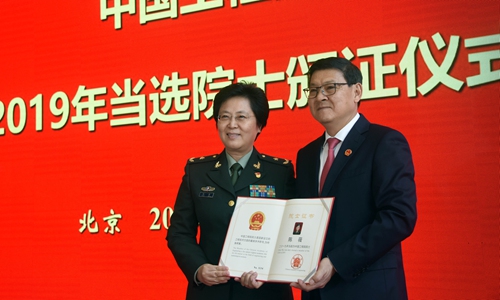HOME >> CHINA
Vaccine pursuer dedicated to finding bio shield against possible germ warfare
By Global Times – Agencies Source:Global Times Published: 2020/3/26 20:23:40

Chen Wei (left) accepts her title as academician of the Chinese Academy of Engineering on December 3, 2019. Photo: cnsphoto
People familiar with Chen Wei, a military major general, all know one thing very well - she is fast. Chen walks fast, speaks fast, and works at a fast pace. Chen is now working to speed up the development of the vaccine of COVID-19 in China.
On March 16, the novel coronavirus vaccine developed by Chen and her team entered clinical trials. On March 20, 108 volunteers were injected with the COVID-19 vaccine developed by China. Major General Chen Wei, one of the developers of the vaccine, was the first to be injected, reported domestic news site ifeng.com.
One volunteer for the vaccine said that Chen is the real pathfinder.
Fearless volunteer
Chen is a leading epidemiologist and virologist, the doctoral supervisor of the Academy of Military Medical Sciences (AMMS), and an academic at the Chinese Academy of Engineering.
On January 26, 54-year-old Chen led a team and headed to Wuhan in Central China's Hubei Province, the frontline to fight the epidemic.
After arriving in Wuhan, Chen's team started building a portable testing lab, which was in operation on January 30. Experts from Chen's team researched and developed a testing kit, which works together with automated nucleic acid extraction technology to speed up the testing of suspected patients.
This is not Chen's first time confronting an epidemic. As a leading figure of a team of experts at China's Biological Hazards Prevention and Control Program, she made great contributions in fighting against the severe acute respiratory syndrome (SARS), and achieved remarkable results in treating many viruses including Ebola and anthrax.
After the SARS broke out in China in 2003, Chen's team took the leading role in successfully isolating the coronavirus.
To test whether the interferon against hepatitis C is applicable to prevent SARS, she was the first to jump into the lab.
According to protocol, researchers should not stay in a negative pressure lab for more than five hours, but Chen stayed in the lab for eight to nine hours every day.
"We tried not to drink or eat before going in the lab, and even used diapers to stay longer inside," Chen said.
In the sequential experiments, Chen and her team were isolated because of daily contact with a high-concentration of SARS virus every day. She was separated from her son for more than 100 days.
One day when she appeared on a TV program, her son rushed to the TV and kissed his mother's image. Chen's husband took a picture of the moment and sent it to her. Chen burst into tears after seeing it.
Eventually Chen's team proved the interferon spray is effective in preventing SARS. As a result, more than 14,000 medical workers in more than 30 SARS special hospitals that used the spray were free from infection.
Shared benefit
In 2004, Chen turned to the fight against the Ebola virus. When most Chinese people had no idea about what Ebola is, Chen had sensed that "Ebola is a flight away from us."
In 2014, the virus broke out in West Africa before spreading to Europe and the Americas after mutation. Chen decided to go to the frontline of the fight against Ebola in Africa.
On the basis of her previous research, Chen's team developed the world's first Ebola vaccine that entered clinical trial. A small dose of the vaccine meant Africa was a step closer to successfully controlling the Ebola epidemic, bringing hope of survival for many. It was China's first self-developed vaccine to be permitted for clinical tests abroad.
"It [Ebola] is a virus with high death rate and we still know little about it. I was asked by many people including my fellow researchers 'what is Ebola and who will use the vaccine after you develop it?'" she said. "I didn't and couldn't answer these questions at that time," Chen added.
In May, 2015, Chen and her team arrived in Sierra Leone for the second phase of Ebola vaccine test.

Photo: VCG
She visited a local orphanage in Sierra Leone. That visit gave Chen a new goal: "I want the whole world to get access to our vaccine.""There were 48 children, their family members were all killed by Ebola, which compelled us to develop the vaccine. We wanted the vaccine to not only be used in China but also benefit the international community," she said.
After an earthquake jolted Wenchuan of Southwest China's Sichuan Province on May 12, 2008, AMMS organized a 30-member team to support Sichuan on May 14.
On the same day, AMMS compiled a brochure on epidemic control after the disaster and dispatched a team to Sichuan on the early morning of May 15 by airplane. During the disaster rescue, Chen worked in Wenchuan as the leader of the national health and epidemic control team.
During the Beijing Olympic Games in 2008, Chen also worked as an expert to crack down on terror threats involving nuclear, chemical and biological weapons.
Research for peace
Born and raised in Lanxi county of East China's Zhejiang Province, Chen was a "straight-A" student. In 1984, she was admitted to the chemical engineer department of Zhejiang University. With excellent performance and grades during college, Chen was the only student recommended by Zhejiang University to Tsinghua University for postgraduate study.
In 1991, 25-year-old Chen decided to work for an enterprise based in Shenzhen, South China's Guangdong Province. But she ended up working for the military that year.
Chen said she was deeply attracted by the research subjects and scientific equipment in the AMMS in Haidian district of Beijing when she was purchasing lab agents for her teacher.
She left the Shenzhen enterprise and was recruited by the military to develop anti-virus drugs. She started researching deadly viruses like the plague, anthrax, and Ebola. A colleague from the Shenzhen enterprise tried to persuade her to stay away from these subjects because of the risk.
Chen said she believes pathogenic microbial could be used by others as lethal weapons during a war, and trigger a large-scale epidemic. "I feel obliged to find a bio shield for the country and people," said Chen.
Newspaper headline: The real pathfinder